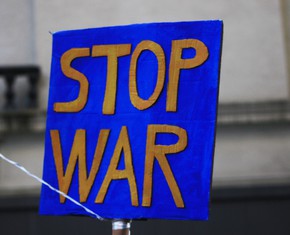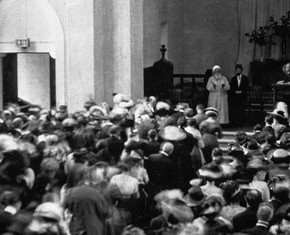The views expressed in our content reflect individual perspectives and do not represent the authoritative views of the Baha'i Faith.
Why is it so easy for our leaders to lie? If it wasn’t, there would be fewer lies told—and Pinocchio would not have had a story to tell.
The short, and obvious, answer: Lies allow us to manipulate, to get our own way, or to present a false impression of ourselves to others. In spite of the fact that we know lies erode trust, decrease confidence and are destructive to those who are the recipients, we do it anyway. The destructive force of lies increases exponentially when the person lying has great power and has access to the public ear.
Why people lie
We all have egos, so we lie to give ourselves some kind of personal advantage. The Baha’i teachings tell us that:
Sincerity is the foundation-stone of faith. That is, a religious individual must disregard his personal desires and seek in whatever way he can wholeheartedly to serve the public interest; and it is impossible for a human being to turn aside from his own selfish advantages and sacrifice his own good for the good of the community except through true religious faith. For self-love is kneaded into the very clay of man, and it is not possible that, without any hope of a substantial reward, he should neglect his own present material good. – Abdu’l-Baha, The Secret of Divine Civilization, pp. 96-97.
Because of that built-in self-love and our human ego, or the insistent self, we automatically do not want to be constrained. In other words, we want to be able to do what we want, when we want and where we want—for our own selfish advantage. Of course, our egos automatically mean this tendency is always present, either consciously or unconsciously, as a part of who we are. To deal with the insistent self, we must first become aware of its existence and then realize we have the power to confront it head on—this is the road to spiritual maturity.
The personal price of lying
Those who chronically lie live in a fantasy world of their own making, where they begin to believe in their own lies. This fantasy, without the foundation of truthfulness, makes other virtues unattainable:
Consider that the worst of all qualities and the most odious of all attributes, and the very foundation of all evil, is lying, and that no more evil or reprehensible quality can be imagined in all existence. It brings all human perfections to naught and gives rise to countless vices. – Abdu’l-Baha, Some Answered Questions, newly revised edition, p. 249.
The Baha’i teachings say that a happy, spiritual life requires honesty, which involves bringing ourselves to account each day to correct our behavior. Lying makes this self-reflection much more difficult. Without that constant self-correction, consistent liars squander their greatness in this world, and jeopardize the successful progress of the soul after death–which lasts for eternity.
Leaders who lie
The lies influential leaders tell have grave consequences for society. They spread into the world at large, burrowing their way into the public conversation, burdening the hearts and minds of everyone. By their very nature these high-level lies are divisive, confusing, and destructive. They produce chaos and, as a result, threaten societal unity. Baha’u’llah told the world’s kings and rulers that:
Trustworthiness is the greatest portal leading unto the tranquillity and security of the people. In truth the stability of every affair hath depended and doth depend upon it. All the domains of power, of grandeur and of wealth are illumined by its light. – Baha’u’llah, Tablets of Baha’u’llah, p. 37.
Sadly, ordinary citizens pay the price for lies told by their leaders, which jeopardize a society’s security, tranquility and stability.
Can we demand better?
Yes, we can demand better from our leaders—but we can’t demand honesty, truthfulness and trustworthiness from others when we do not demand it of ourselves. Just imagine how wonderful it would be to wake up in a world where we know that truth surrounds us with its comfort, security and straightforwardness. We would not have to engage in the exhausting process of remembering the lies we have told in order to cover for them, or mistrust every statement from every public official, or lose faith and trust in our leaders:
Beware, O people, that ye deal not treacherously with any one. Be ye the trustees of God amongst His creatures, and the emblems of His generosity amidst His people. They that follow their lusts and corrupt inclinations, have erred and dissipated their efforts. They, indeed, are of the lost. – Baha’u’llah, Gleanings from the Writings of Baha’u’llah, p. 297.
The Baha’i teachings repeat this same exact theme in many places:
Let the Light of Truth and Honesty shine from them, so that all who behold them may know that their word in business or pleasure will be a word to trust and depend upon. Forget self and work for the whole race. – Abdu’l-Baha, Abdu’l-Baha in London, p. 124.
So, to be honest requires that we forget ourselves and our selfish personal ego and interests—there’s that insistent self again–which in turn will benefit the whole human race, ourselves included. This is the goal. We reach it by directly confronting the insistent self, without the roadblock of lying. When truth and honesty shine from our faces every day, it will surround us with its security, tranquility and stability.
You May Also Like
Comments

















But now we have the internet, that amazing, prophecized, universal language, uniting East and West. It's transformative powers are already at work. No longer do a few groups maintain control over public perception of the facts, it's been decentralized in diversity, and connected in unity.